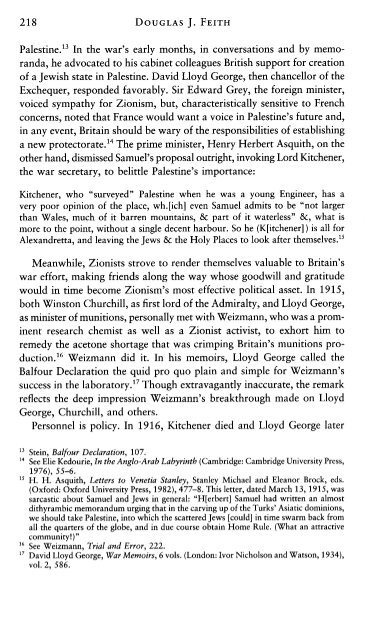Churchill, Palestine and Zionism, 1904-1922 - Douglas J. Feith
Churchill, Palestine and Zionism, 1904-1922 - Douglas J. Feith
Churchill, Palestine and Zionism, 1904-1922 - Douglas J. Feith
Create successful ePaper yourself
Turn your PDF publications into a flip-book with our unique Google optimized e-Paper software.
218 DOUGLAS J. FEITH<br />
<strong>Palestine</strong>.13 In the war's early months, in conversations <strong>and</strong> by memor<strong>and</strong>a,<br />
he advocated to his cabinet colleagues British support for creation<br />
of a Jewish state in <strong>Palestine</strong>. David Lloyd George, then chancellor of the<br />
Exchequer, responded favorably. Sir Edward Grey, the foreign minister,<br />
voiced sympathy for <strong>Zionism</strong>, but, characteristically sensitive to French<br />
concerns, noted that France would want a voice in <strong>Palestine</strong>'s future <strong>and</strong>,<br />
in any event, Britain should be wary of the responsibilities of establishing<br />
a new protectorate.!4 The prime minister, Henry Herbert Asquith, on the<br />
other h<strong>and</strong>, dismissed Samuel's proposal outright, invoking Lord Kitchener,<br />
the war secretary, to belittle <strong>Palestine</strong>'s importance:<br />
Kitchener, who "surveyed" <strong>Palestine</strong> when he was a young Engineer, has a<br />
very poor opinion of the place, wh.[ich] even Samuel admits to be "not larger<br />
than Wales, much of it barren mountains, & part of it waterless" &, what is<br />
more to the point, without a single decent harbour. So he (K[itchener]) is all for<br />
Alex<strong>and</strong>retta, <strong>and</strong> leaving the Jews & the Holy Places to look after themselves. IS<br />
Meanwhile, Zionists strove to render themselves valuable to Britain's<br />
war effort, making friends along the way whose goodwill <strong>and</strong> gratitude<br />
would in time become <strong>Zionism</strong>'s most effective political asset. In 1915,<br />
both Winston <strong>Churchill</strong>, as first lord of the Admiralty, <strong>and</strong> Lloyd George,<br />
as minister of munitions, personally met with Weizmann, who was a prominent<br />
research chemist as well as a Zionist activist, to exhort him to<br />
remedy the acetone shortage that was crimping Britain's munitions productionY<br />
Weizmann did it. In his memoirs, Lloyd George called the<br />
Balfour Declaration the quid pro quo plain <strong>and</strong> simple for Weizmann's<br />
success in the laboratory.!? Though extravagantly inaccurate, the remark<br />
reflects the deep impression Weizmann's breakthrough made on Lloyd<br />
George, <strong>Churchill</strong>, <strong>and</strong> others.<br />
Personnel is policy. In 1916, Kitchener died <strong>and</strong> Lloyd George later<br />
13 Stein, Balfour Declaration, 107.<br />
14 See Elie Kedourie, In the Anglo-Arab Labyrinth (Cambridge: Cambridge University Press,<br />
1976), 55-6.<br />
15 H. H. Asquith, Letters to Venetia Stanley, Stanley Michael <strong>and</strong> Eleanor Brock, eds.<br />
(Oxford: Oxford University Press, 1982),477-8. This letter, dated March 13, 1915, was<br />
sarcastic about Samuel <strong>and</strong> Jews in general: "H[erbert] Samuel had written an almost<br />
dithyrambic memor<strong>and</strong>um urging that in the carving up of the Turks' Asiatic dominions,<br />
we should take <strong>Palestine</strong>, into which the scattered Jews [could] in time swarm back from<br />
all the quarters of the globe, <strong>and</strong> in due course obtain Home Rule. (What an attractive<br />
community!) "<br />
16 See Weizmann, Trial <strong>and</strong> Error, 222.<br />
17 David Lloyd George, War Memoirs, 6 vols. (London: Ivor Nicholson <strong>and</strong> Watson, 1934),<br />
vol. 2,586.


